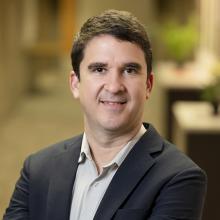Search
Master of Science in Health Care Management
Master of Science in Health Care Management (full-time)

The Master of Science in Health Care Management prepares you to improve, streamline, and expand complex health systems. Gain access to the resources, reputation, and experience of Johns Hopkins Hospital and Johns Hopkins University’s schools of medicine, nursing, and public health to build your skills and expand your network.
The Career Development Office is committed to providing opportunities for you to build professional skills and competencies that are essential for building the career you want.
Graduates of this program work in a variety of industries including consulting, finance, management, operations, and logistics.
Program details
Financial Aid & Scholarships
Program features
Business foundation
Learn the most relevant business skills to become an effective and efficient leader who will improve quality and access to health care through a curriculum designed to bring you to the frontier of health care strategy.
Lead in health
Poets & Quants recognized Carey Business School in their 2024 Best in Class Awards for the Business of Health. Develop a comprehensive understanding of complex health care challenges and graduate prepared to lead, manage, and drive meaningful change in evolving health-related industries.
Experiential learning
Get involved in project-based experiential learning opportunities to develop collaborative partnerships with businesses and nonprofits, meet health policy leaders, or work within the Johns Hopkins ecosystem.
Johns Hopkins Health System and Hopkins Business of Health Initiative
Harness the resources, reputation, and experience of Johns Hopkins’ top-ranked Schools of Medicine and Nursing, and the Bloomberg School of Public Health.
-
- 332 average GRE
- 72% female / 28% male
- 3.53 average undergraduate GPA
- < 1 average years of full-time work experience
- 4 countries represented
- 23 average age
Olu Akinrimisi’s passion to help others led him to pursue a career in health care. It’s also taken him to the Johns Hopkins Carey Business School. As a student in the Master of Science in Health Care Management program, he’s learning business skills that will help him achieve his career goals while also making an impact on the community he serves.
Program Comparison
- In-person, Baltimore, 1 year
- Recent graduates, early career professionals
- Leverage the resources, reputation, and experience of the top-ranked Johns Hopkins Schools of Medicine and Nursing, and the Bloomberg School of Public Health
- Real-world business and health care projects including the two-part signature Health Care Consulting Practicum
- In-person, Baltimore, 2 years, 2 degrees, STEM-designated
- Study at top-ranked Johns Hopkins Bloomberg School of Public Health
- Integrate business foundations with public health
- Career-focused experiential learning with access to global health leaders
Curriculum
As a student in the Master of Science in Health Care Management program, you will gain the confidence and skills to make strategic decisions that improve the state of today's health systems. Stay current in the rapidly changing health care environment and graduate prepared to make a meaningful impact in the overall health and well-being of individuals and communities.
The latest edition of the Carey Business School University Catalog is available.
-
Health care is one of the fastest growing, increasingly complicated sectors. There's no shortage of opportunity for new leadership in the industry, as demand for qualified health care professionals continues to grow. The Master’s in Health Care Management degree prepares you to assess and act on opportunities, innovate, and improve productivity in all health care areas.
A health care management degree is unique because it recognizes the complexities of the sector: providers, payers, innovators, and institutions. You'll acquire the foundations of business and learn how to respond to the latest health care discoveries through first-hand exposure to current research and industry trends in practice. As part of a team, you’ll participate in project-based courses where you will apply practical management skills and build innovative business solutions for significant health care issues.
Required courses (20 credits)*:
Business foundations (6 credits)
- BU.120.620 Business Communication
- BU.131.601 Business Leadership and Human Values
- BU.510.601 Statistical Analysis
Functional core (14 credits)
- BU.881.702 Frameworks for Analyzing Health Care Markets
- BU.881.703 Health Care Law and Regulation
- BU.881.705 Health Marketing and Access
- BU.883.710 Health Analytics
- BU.881.706 Health Innovation and Evaluation
- BU.550.620 The US Health Care System: Past, Present, and Future
- BU.883.706 Health Care Organization and Management
Electives (Choose 5 courses, 10 credits)**:
- BU.210.620 Accounting and Financial Reporting
- BU.920.724 Artificial Intelligence and Business of Health
- BU.550.710 Applied and Behavioral Economics in Health Care
- BU.150.710 Discovery to Market I
- BU.150.715 Discovery to Market II
- BU.920.723 Ethics of Business of Health
- BU.881.701 Fundamentals of Health Care Systems
- BU.883.705 Health Care Financing and Financial Management
- BU.890.720 Health Care Consulting Practicum I
- BU.890.725 Health Care Consulting Practicum II
- BU.883.702 Health Information Technology
- BU.883.703 Medical Devices and Diagnostics
- BU.883.708 Negotiation in Health Care Settings
- BU.883.704 Pharmaceutical Strategy
- BU.883.707 The Wire: Business Solutions for Community Health Improvement
- Carey Elective of Choice
-
School
Johns Hopkins Carey Business School
Johns Hopkins Bloomberg School of Public Health
Degree
MS in Health Care Management (MSHCM)
Master of Health Administration (MHA)
Target Audience
Early-career individuals with an interest in business and health care management. No health care experience is required.
Early-career individuals interested in health care leadership. Some exposure to health care work or internships is required.
Program Duration
Intensive 1-year program with experiential courses that immerse students in real-world health care settings
2 years, including a full-time, 11-month compensated administrative residency through a matching process.
Focus Areas
Data-driven and analytical, focusing on health care finance, entrepreneurship, and business strategy within health care.
Focuses on developing comprehensive leadership, analytical, financial, and strategic management skills for improving health care delivery.
Career Preparation
Prepares students for top consulting, managerial, and entrepreneurial roles across the health care ecosystem (providers, payers, innovators, regulators).
Best suited for future health care executives aiming for leadership roles within hospitals, health systems, insurance, and consulting.
Practical Experience
Experiential and project-based courses in collaboration with the Johns Hopkins ecosystem.
Includes practical experience through an 11-month residency in prominent health care delivery or consulting firms.
US Health Care Focus
Yes, focused on understanding the complexities and managing stakeholders of the US health care system.
Yes, with an emphasis on managing and leading US health care organizations and systems.
Accreditation
AACSB School Accreditation
Program is a member of the Business Alliance of Health Care Management (BAHM)
CEPH School Accreditation
Program is CAHME accredited
-
Explore career data
Throughout your program and beyond, Carey career and leadership coaches and employer relations industry specialists provide you with the support, resources, and opportunities you need to achieve your unique career goals.
Graduates of this program work in a variety of industries including consulting, finance, management, operations, and logistics. Here are just a few organizations where program alumni are making an impact.
Companies (sample):
- Baltimore Jazz Alliance
- Bloomberg
- Children’s Hospital of Philadelphia
- IBM
- Johnson & Johnson
- Kraft Heinz
- Lenovo
- L’Oreal
- MARS
- Medifast
- Nestle
- Proctor & Gamble (P&G)
- Tiffany & Co.
- Unilever
- World Financial Group
Titles (sample):
- Account Supervisor
- Board Development Specialist
- Business Development
- Data Analyst
- Digital Marketing Manager
- Marketing Director
- Marketing Manager
- Product Manager
- Research Analyst
- Sales and Marketing Executive
- Senior Product Manager
Signature experiences
Your business education doesn’t end in the classroom. Step out of your comfort zone as you partner with students across Johns Hopkins and businesses to take your learning to the next level.
Featured Business of Health Stories

business of health
Q&A: Associate chief medical officer uses Carey MS in Health Care Management to lead through pandemic
business of health
Transforming public health with human-centered design
research
How do business students fit into the nexus between health innovation and regulation?
business of health
Q&A: Associate chief medical officer uses Carey MS in Health Care Management to lead through pandemic
business of health
Transforming public health with human-centered design
research
How do business students fit into the nexus between health innovation and regulation?Attend an event
Carey Business School offers admissions events for prospective students to connect with our admissions team. Through online sessions and in-person regional events, the Carey team is here to answer your questions and support your graduate business journey.
Connect with a Carey student or alum
Our students come from all over the world and represent all of the different graduate business programs we have here at Carey. Connect with one of them directly to learn more about life at Carey.
Q&A: COVID-19’s impact on health care
TaSi People
People

Technology and Society Initiative
Director

Michael Luca, PhD
Professor, Johns Hopkins Carey Business School
Michael Luca is a professor and the director of the Technology and Society Initiative at the Johns Hopkins University Carey Business School, and a faculty research fellow at the NBER. Professor Luca's research, teaching, and advisory work focuses on the design of online platforms, and on the ways in which data can inform managerial and policy decisions.
His research has been published in academic journals including the Journal of Economic Perspectives, Management Science, the Proceedings of the National Academy of Sciences, American Economic Review: Papers and Proceeding, the American Economic Journal: Applied Economics, and the American Economic Journal: Microeconomics.
He has also written about behavioral economics and online platforms for media outlets including The Wall Street Journal, Harvard Business Review, The Atlantic, Wired, and Slate. His research has been written about in a variety of media outlets including The Wall Street Journal, New York Times, New Yorker, Atlantic, Economist, Washington Post, Financial Times, Guardian, Huffington Post, Harvard Business Review, Time, USA Today, Boston Globe, LA Times, San Francisco Chronicle, Fortune, Mashable, GQ, Wired, and Vox.
Professor Luca has developed and taught materials for executive education and MBA courses on business analytics, technology, behavioral economics, and leadership.
Professor Luca's current and past advisory roles include Board Member of the National Association for Business Economics (NABE), Academic Advisory Board Member of the Behavioural Insights Team, Advisory Board Member for the OECD Digital for SMEs Global Initiative, and Advisory Board Member for the CNBC Technology Executive Council.
Faculty Affiliates

Ritu Agarwal, PhD
Wm. Polk Carey Distinguished Professor, Johns Hopkins Carey Business School
Ritu Agarwal is the Wm. Polk Carey Distinguished Professor of Information Systems and Health at the Johns Hopkins Carey Business School, and the founding co-director of the Center for Digital Health and Artificial Intelligence (CDHAI). She is an expert in the strategic use of information technology, digital transformation of health care, health analytics, and artificial intelligence applications in health.
Professor Agarwal’s research seeks to apply advanced digital technologies to health care practice and delivery, and to unravel the underlying behavioral, psychological, and social processes that enable and constrain successful health care interventions. She has been a pioneer in research related to digital technologies and health among scholars in leading business schools, and has devoted her research efforts towards improving health care quality, promoting equity and access, and reducing costs. She has published over 100 articles in leading business and health care journals such as Proceedings of the National Academy of Sciences, Information Systems Research, MIS Quarterly, Management Science, Journal of the American Medical Informatics Association, and Health Affairs.
Agarwal has testified before the National Committee on Health and Vital Statistics and the U.S. Department of Health on her research related to digital technologies and health. She is an appointed member of the Federal Advisory Council for the National Institute of Allergy and Infectious Diseases (NIAID) of the NIH and has served on the NIH Working Group for Integration of Behavioral and Social Science Research.

Filipe Campante, PhD
Bloomberg Distinguished Professor, Johns Hopkins Carey Business School
Filipe Campante is a Johns Hopkins University Bloomberg Distinguished Professor with appointments at Carey Business School and the School of Advanced International Studies. At SAIS, he serves as the vice dean for Faculty Affairs and Research. He is interested in political economy, development economics, and urban/regional issues. His research looks at what constrains politicians and policymakers beyond formal checks and balances: cultural norms, institutions, media, and political protest. In particular, it has focused on how these informal constraints are affected by the spatial distribution of people and economic activity, by access to information, by the evolution of cultural norms, and by the structure of the economy. He tries to answer these aggregate questions — what happens to countries or states or cities — with an applied microeconomic approach.
Campante’s work has appeared in leading academic journals such as the American Economic Review and the Quarterly Journal of Economics, among others. It has also received multiple mentions in outlets such as the New York Times, Science, NPR, Washington Post, The Economist, Los Angeles Times, Foreign Affairs, and Politico, among others. Campante is a research associate at the National Bureau of Economic Research (NBER), and was assistant and associate professor of Public Policy at Harvard from 2007 until he joined Johns Hopkins University in 2018.

Andrew Ching, PhD
Professor, Johns Hopkins Carey Business School
Andrew Ching, PhD (University of Minnesota), is a full professor of economics at Johns Hopkins Carey Business School, and serves in a joint appointment with the Bloomberg School of Public Health. Prior to joining Johns Hopkins University, he was a full professor of marketing at the University of Toronto’s Rotman School of Management. He also had faculty appointment at Ohio State University, and visiting professor appointments at UCLA, Cornell University, University of Wisconsin-Madison, National University of Singapore, HKUST and Chinese University of Hong Kong (Distinguished Visiting Professor). In addition, he was a visiting scholar at Harvard University, Federal Reserve Bank of Boston, and Federal Reserve Bank of Kansas City. He has previously served as an associate editor for Management Science, guest associate editor for Marketing Science and Journal of Marketing Research, and a member of editorial boards for Marketing Science. He is currently serving as a member of editorial boards for Journal of Marketing Research and International Journal of Research in Marketing. His research focuses on developing new empirical structural models and estimation methods to understand the forward-looking, strategic, learning and bounded rational behavior of consumers and firms. He has applied these techniques to study the demand for prescription drugs, nursing homes, new technology adoption decisions, choice of payment methods, information spillover, late-mover advantages, video games demand, stockpiling, online support groups, and integrated marketing communication. His latest research focuses on modeling how consumers and firms adaptively learn in a dynamic world using AI and digital tools.

Itay Fainmesser, PhD
Associate Professor, Johns Hopkins Carey Business School
Itay Fainmesser is a professor at Johns Hopkins Carey Business School, and studies how social networks and social media affect and are affected by market activities and market rules. His current work studies the pricing of network goods, the role of intermediaries in markets, the shape and evolution of trust networks, the market for online influence, and user privacy in online platforms. His work was published in top economics and management journals such as The Review of Economic Studies, Management Science, and The Journal of Economic Theory.

Gordon Gao, PhD
Professor, Johns Hopkins Carey Business School
Guodong (Gordon) Gao, PhD, MBA, is a professor at the Johns Hopkins Carey Business School and co-director of the Center for Digital Health and AI (CDHAI). Gao’s research interests include AI in health care, AI fairness, mHealth, and quality transparency. His research has been funded by NSF, NIH and AHRQ. Gao is dedicated to advancing AI for Health Equity education, especially for the under-resourced population and regions. He led several initiatives in the NIH-funded AIM-AHEAD program, such as the Professional Development Program, the Program for AI Readiness, and the Program for American Indian Higher Education Consortium. His work has been published at leading medical and business journals.

Wesley W. Koo, PhD
Assistant Professor, Johns Hopkins Carey Business School
Wesley W. Koo is an assistant professor in the Management & Organization area at Johns Hopkins Carey Business School. His research examines the relations between business, technology, and society. It focuses on the governance of platform ecosystems and the effects of modern technology on business and society. He has studied rural entrepreneurs' ability to navigate changing algorithms and how platform governance affects the relations between domestic workers and their employers. His research has been published in top-tier academic journals and disseminated by leading media outlets. He serves on the editorial boards at Organization Science and Strategic Management Journal. Wesley received his PhD at Stanford University, where his research was supported by the Stanford Technology Ventures Program, Stanford SEED, Accel Partners, Strategic Management Society, and Alibaba Group. Prior to Stanford, Wesley was a tech entrepreneur and received dual degrees in Environmental Engineering and Management from MIT.

Julia Levine, PhD
Assistant Professor, Johns Hopkins Carey Business School
Julia Levine is an assistant professor at Johns Hopkins Carey Business School. Her research interests lie at the intersection of marketing and public policy. She studies how people's past choices impact their current choices, both in the case of brand loyalty and category-level consumption. She examines these dynamics in policy-relevant contexts, including demand for addictive goods and nutritional inequality.
Carey research explores impact of the pandemic on emotional wellbeing
Start Making Sense: New Faculty Member Michelle Barton Studies Ways to Manage Ambiguity
Stay the Course with Personal Finances during Pandemic, Carey Expert Advises
Jeffrey Hooke, MBA
MBA/MSN in Healthcare Organizational Leadership
MBA/MSN in Healthcare Organizational Leadership

Join Johns Hopkins’ commitment to providing exceptional patient care and earn your MBA/MSN in Healthcare Organizational Leadership. Complement your nursing skillset with the business and leadership acumen to manage complex issues specific to the health care industry.
This program is offered both part-time and full-time. Choose your format, completing your MBA coursework on-site, online, or a combination of both. And graduate ready to provide excellent care and take on the complex challenges that face nursing.
Program Details




Financial Aid & Scholarships
Lead the future of health care
As the health care landscape grows more complex, the need for leaders who understand both clinical care and business strategy has never been greater. The MBA/MSN in Healthcare Organizational Leadership, offered jointly by the Johns Hopkins Carey Business School and the School of Nursing, equips experienced nurses to lead systems, teams, and innovation at every level of health care.
Why the MBA/MSN in Healthcare Organizational Leadership?
Clinically grounded, strategically focused
Build upon your nursing expertise while developing your ability to lead organizations, manage teams, and solve health system challenges.
Two degrees, one powerful path
Earn your Master of Science in Nursing and Master of Business Administration through an integrated program that prepares you to lead with confidence—clinically, operationally, and financially.
Choose the format that fits your life
MBA coursework is delivered full-time, onsite in Baltimore or part-time, online in a flexible mix of asynchronous and live sessions. MSN courses are primarily in-person at the Johns Hopkins School of Nursing. Both formats provide a path to career growth, aligned to your professional and personal responsibilities
Real-world practice
With 504 practicum hours and optional MBA residencies, you’ll gain the on-the-ground experience to lead interprofessional teams and drive change in patient care delivery and health system operations.
What you'll learn
-
In this 61-credit program, you’ll master skills across leadership, strategy, health policy, finance, and patient-centered care. You’ll graduate prepared to lead in hospitals, health systems, community health organizations, or the broader health innovation space.
-
Delivered by the Johns Hopkins School of Nursing, this part of the curriculum builds advanced competencies in leadership, systems thinking, and organizational culture.
Courses include:
- Advanced Nursing Health Policy
- Philosophical, Theoretical, and Ethical Basis of Advanced Nursing Practice
- Leadership: Organizational Dynamics, Complexities, and Change
- Leadership and Organizational Culture: Theories and Practice in Contemporary Health Care
- Leadership Role Identity and Career Development
- Healthcare Organizational Leadership Practicum I, II, and III
- The Research Process and Its Application to Evidence-Based Practice
-
22 credits of required business foundations courses:
- Accounting and Financial Reporting
- Business Analytics
- Business Communication
- Corporate Finance
- Leadership and Organizational Behavior
- Marketing Management
- Negotiation
- Operations Management
- Statistical Analysis
Strategic Management
14 credits of elective courses:
Electives can be tailored to your interests or aligned with one or more MBA specializations:
- Artificial Intelligence for Business
- Business Analytics and Risk Management
- Entrepreneurship
- Finance
- Health Care Management
- Leadership
- Marketing
- Real Estate
Program comparison
- 61 credits, 504 practicum hours
- Full-time students graduate in two years, part-time students graduate in three years
- Asynchronous and/or fully synchronous courses
- Optional in-person experiences
- Online, flexible format
- Complete your degree in two to three years
- Optional in-person experiences
- Asynchronous and/or fully synchronous courses
- Online, flexible format
- Complete your degree in two years
- Asynchronous and/or fully synchronous courses
- Curriculum includes blend of traditional and project-based courses